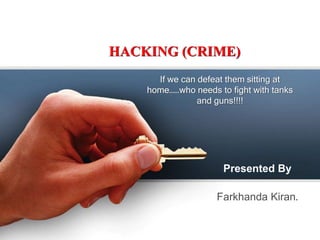
Hacking
- 1. HACKING (CRIME) If we can defeat them sitting at home……who needs to fight with tanks and guns!!!! Presented By Farkhanda Kiran.
- 2. INTRODUCTION The internet is growing rapidly. It has given rise to new opportunities in every field we can think of be it entertainment, business, sports or education. There’re two sides to a coin. Internet also has it’s own disadvantages is Cyber crime- illegal activity committed on the internet.
- 3. DEFINING CYBER CRIME Crime committed using a computer and the internet to steal data or information. Illegal imports. Malicious programs.
- 4. Cyber crime is nothing but where the computer used as an object or subject of crime..
- 5. TYPES OF CYBER CRIME • Hacking • Denial of service attack • Virus Dissemination • Computer Vandalism • Cyber Terrorism • Software Piracy
- 7. HACKING • To gain illegal or unauthorized access to a file, computer, or network
- 8. HISTORY • Phase 1: early 1960s to 1970s – It was a positive term introduce by MIT – A "hacker" was a creative programmer who wrote elegant or clever code – A "hack" was an especially clever piece of code
- 9. HISTORY • Phase 2: 1970s to mid 1990s Phone Phreaker or Phone Hacker
- 10. HISTORY • Phase 3: beginning with the mid 1990s Phreaks started to migrate to computers -Political hacking (Hacktivism) surfaced – Denial-of-service (DoS) – Large scale theft of personal and financial information
- 11. Who is a “HACKER” ?
- 12. HACKER • who access computer system and network without authorization.
- 13. Types of Hackers
- 15. 1. Black Hat hackers always do illegal work. They Work for black money . 2. Hack into to Bank Websites , credit card websites and stole Money from accounts in bank websites. 3. They use their knowledge for illegal purposes.
- 17. •White hat hackers are like Ethical Hackers . They use their skills for good purposes •They work for organizations for stop the illegal activities through black hat hackers.
- 19. 1. Grey Hat hackers have both qualities like black hat hackers and white hat hackers . 2. They use their knowledge for bad purposes and good purposes too.
- 20. Terminologies Hackers • Access computer systemornetworkwithoutauthorization • Breaks thelaw; cango toprison Crackers • Break into systems to steal or destroy data • U.S.Department of Justice calls both hackers Ethical hacker • Performs most of the same activities but with owner’s permission
- 21. Hacktivism
- 22. Hacktivism/Political Hacking • The act of hacking, or breaking into computer system, for a political or socially motivated purpose.
- 23. The Law: Catching and Punishing Hackers: • 1986 Congress passed the Computer Fraud and Abuse Act (CFAA) – Covers government computers, financial and medical systems, and activities that involve computers in more than one state, including computers connected to the Internet – The USA Patriot Act expanded the definition of loss to include the cost of responding to an attack, assessing damage and restoring systems
- 24. The Law: Catching and Punishing Hackers (cont.): • A variety of methods for catching hackers – Law enforcement agents read hacker newsletters and participate in chat rooms undercover – They can often track a handle by looking through newsgroup archives – Security professionals set up ‘honey pots’ which are Web sites that attract hackers, to record and study – Computer forensics is used to retrieve evidence from computers
- 25. The Law: Catching and Punishing Hackers (cont.): • Security – Internet started with open access as a means of sharing information for research – Attitudes about security were slow to catch up with the risks – Firewalls are used to monitor and filter out communication from untrusted sites or that fit a profile of suspicious activity – Security is often playing catch-up to hackers as new vulnerabilities are discovered and exploited
- 26. The Law: Catching and Punishing Hackers (cont.): • Responsibility for Security – Developers have a responsibility to develop with security as a goal – Businesses have a responsibility to use security tools and monitor their systems to prevent attacks from succeeding – Home users have a responsibility to ask questions and educate themselves on the tools to maintain security (personal firewalls, anti-virus and anti-spyware)
- 27. Conclusion • Hacking is a good computing skill that can be used for good or bad intention. • Hacking does not mean using your computing skills to do bad. Society have forgotten the difference between crackers and hackers. • Learning skills of hacking is only for the greater good.
- 28. References • http://compnetworking.about.com/od/networksecurityprivacy/f/what-is-hacking. htm • http://whatishacking.org/ • http://whatismyipaddress.com/hacking • http://dictionary.reference.com/browse/hacker?s=t • http://wiki.answers.com/Q/What_is_the_difference_between_hacking_and_crac king • http://answers.yahoo.com/question/index?qid=20071206182542AA3JzNy • http://www.huffingtonpost.co.uk/eva-blumdumontet/29c3-hacking-politics_ b_2512573.html • http://answers.yahoo.com/question/index?qid=20110801131429AAFTktO • http://www.• http://www.Thank cs.berkeley.edu/~bh/hacker.html ehow.com/about_4673738_why-do-You people-hack.html • http://venturebeat.com/2011/12/28/anonymous-stratfor-hack-10-things-to-know/ • http://www.slideshare.net/TerroWhite/ethical-hacking-and-it-security-training • http://www.switched.com/2011/02/24/what-to-do-email-account-hacked/
- 29. Any **Queries **Ask@Your Own Risk
